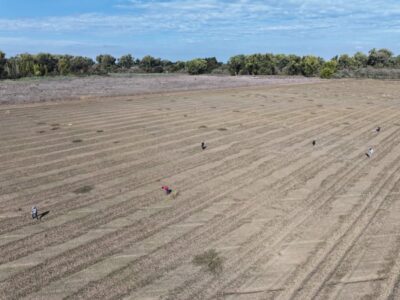California may be temporarily shut down, but River Partners crews are in the field, revitalizing the river landscapes that are so important to our state’s future.
This week, Eligio Hernandez and three River Partners field techs are riding large mowers and spraying weeds across 850 acres of grass at the Hamilton City Flood Risk Reduction Project. In West Sacramento, Luis Gutierrez Uribe and his crew are installing the irrigation system for 45,000 trees and shrubs in a restored habitat area alongside a new levee. The levee setback will protect homes and businesses just a few dozen feet from this high-risk flood area.
It is hard work creating products that include birdsong, insect diversity, groundwater recharge, fresh air, flood safety, and water conservation. Our dedicated field crews are growing products that sustain all of us. But instead of harvesting food for our tables, they are replanting riverside forests that increase our communities’ resilience to disaster.

When rivers flood, our restored forests absorb the force of water and can turn it into an opportunity for groundwater storage. When there are wildfires, our reconnected floodplains provide protected spaces and safe migration pathways for wildlife fleeing danger. In a virus lockdown, our natural areas provide people with safe spaces to air out their anxieties, stay fit, and bond with the Earth.

As essential public works, our projects benefit from construction industry and human resource standards that are keeping our crews safe while they help protect our collective future.
I really miss carpooling and face to face meetings with my teams. I miss handshakes. But I’m happy to invest in a responsible coronavirus response. Our workers are staying home if they’re sick or their families need them. Our field restoration job sites allow our staff to work far apart from each other. I’m happy we are taking worker safety and the virus seriously. We are in a solid place to provide continuity of employment and protect the public trust laid in our hands.

At River Partners, our flexible agricultural practices also protect our workforce. We are able to juggle seed collection and processing, planting, watering, and weeding so that our workers stay busy at a distance from one another. We have lost a large percentage of our CCC and regional corps workforce to assist with virus response. But a short downtime doesn’t have to spell bankruptcy, we just have to flex. We can adapt the workload while maintaining public safety, and we can rapidly scale up again when the time comes.
There is no market for bird song and we don’t belong to a trade organization for clean water. Our crews toil in the field to provide these valuable products at a financial loss to our organization. Because our work is recognized as essential to the continued prosperity of California we are able to continue to work through the pandemic.
We are taking every safety precaution to maintain our progress and lead California’s paradigm shift toward ecosystem-based management or multi-benefit landscape restoration. Our approach is a cornerstone of our state’s future, supported by the economies, the natural resource agencies, and the voters of California.

As we hunker down this spring, we can safely spend productive time at our nearby parks and rivers, observing the natural world around us. We can begin to ask more of the critical questions that will help us prepare for the next disaster. Where does my drinking water come from? Who grows my food and at what cost? How are decisions being made that influence my life, the health and safety of my family and community? And what can I do to make us all safer and stronger in an uncertain future?
The answers, I hope, will make it clear that there are many lessons from this disaster that will not go to waste. We can and should emerge from the grief and loss of COVID-19 more aware of the steps needed to ensure a more resilient future for all Californians.
If you are interested in joining our team, we are hiring.








